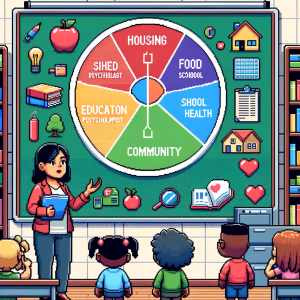
Psychosocial Treatments for Bipolar Spectrum Disorders in Children and Adolescents
Bipolar Spectrum Disorders (BPSDs), including various types of bipolar disorder and cyclothymic disorder, are not just challenges faced by adults. Increasingly, these conditions are being recognized and diagnosed in children and adolescents, significantly impacting their mental health, family life, and academic performance. The article “Psychosocial Treatments for Bipolar Disorder in Children and Adolescents” in Annual Reviews provides a comprehensive overview of the current state of psychosocial treatments for young individuals with BPSDs.
The Prevalence and Impact of BPSDs in Youth
BPSDs in youth manifest in various forms, each with its own set of challenges. These disorders are chronic and can lead to significant impairment in a young person’s life, including academic struggles, difficulties in peer relationships, and high rates of hospitalization. Notably, these conditions are often untreated or inadequately addressed in many cases. Recognizing the signs early and intervening can be crucial in changing the trajectory of these disorders.
The Role of Psychosocial Interventions
While medication is typically a first-line treatment for BPSDs, there’s growing evidence supporting the effectiveness of psychosocial interventions. These treatments, often used alongside medication, offer a more holistic approach. They address not just the symptoms but also the environmental and social factors contributing to the disorder. This includes improving family dynamics, enhancing school performance, and fostering better peer relationships.
Key Interventions and Their Efficacy
The article categorizes psychosocial treatments based on their level of empirical support: well-established, probably efficacious, possibly efficacious, experimental, or questionable. The most well-supported treatments include Family Psychoeducation Plus Skill Building (FP + SB), which involves family-focused psychoeducation, cognitive-behavioral therapy (CBT), and training in communication and problem-solving. These interventions have shown promising results in improving mood symptoms and overall functioning in affected youth.
The Importance of Early Intervention
Managing BPSDs effectively requires crucial early identification and intervention. The earlier the intervention, the better the outcomes, especially in preventing the progression of the disorder. For high-risk youth who may not yet show full bipolar symptoms but have genetic predispositions, preventive interventions can be particularly effective.
School Psychologists: A Crucial Link
School psychologists play a vital role in early identification and intervention. They are often the first to notice changes in a student’s behavior or academic performance that may indicate underlying mental health issues. By understanding the signs of BPSDs and the available psychosocial interventions, they can guide students and their families toward appropriate help.
Future Directions and Challenges
Despite the progress in understanding and treating BPSDs in youth, there are areas needing further research. Understanding how to adapt these treatments for different age groups and severity levels requires additional studies. There’s also a need for more community-based studies to ensure that these interventions are effective in a real-world setting beyond academic or clinical research environments.
Conclusion
The article Psychosocial Treatments for Bipolar Disorder in Children and Adolescents provides invaluable insights into the effective management of BPSDs in young individuals. For school psychologists and other professionals in school mental health, this knowledge is crucial. By staying informed about the latest in treatment options and best practices, they can make a significant difference in the lives of students struggling with these challenging disorders.
Unlock Exclusive Educational Insights!
For just $50 a year, immerse yourself in the leading edge of school psychology. This Week in School Psychology brings you closer to the latest developments and applications in mental health education. Your subscription not only enlightens you but supports a wider movement towards informed impactful education. Sign up today and gain access to a world of exclusive content and community!



